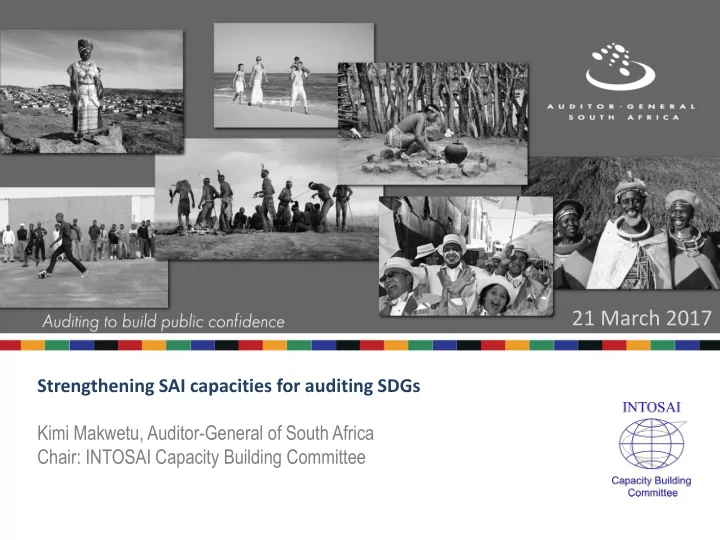

21 March 2017 Strengthening SAI capacities for auditing SDGs Kimi Makwetu, Auditor-General of South Africa Chair: INTOSAI Capacity Building Committee
Strengthening SAI capacities for auditing SDGs Agenda 2030 calls for business unusual – a strategic shift Opportunity to demonstrate SAIs’ value Agenda 2030 will be a missed opportunity for SAIs without strengthened capacities Asses our current capacities, and rapidly address the gaps
SAI strategy for auditing the SDGs Government’s integrated SDG strategies, planning, and new evolving risks will require SAIs to adust our own strategies SAIs must ensure our strategic insights reach the stakeholders who matter Our strategic priorities & budgets must reflect our SDG focus Ensure adequate SAIs mandates – take steps to widen if necessary
Planning the auditing of SDGs SDG audit planning ―a 12 year project requiring a long term but flexible approach Avoid fragmented planning by means of structured following- up of gaps initially identified Limited SAI resources requires well-structured, multi-year planning
Organising our work for auditing the SDGs Agenda 2030 relies on integrating planning, measurement, implementation and reporting systems SAIs’ traditional departmentalized approach to make room for multiple teams able to audit sectors and clusters SAIs will have to consciously manage the change required – • multiple teams & leaders • new communication lines • ensure consistency • value continuous learning
Professional competencies for auditing SDGs General competencies : Critical thinking, perspective taking and social intelligence Research knowledge & skills Attitude – openess and collaboration
Professional competencies for auditing SDGs Performance audit: Agenda 2030 – an opportunity for SAIs to mature PA as a core value-adding audit disciple Specialist expertise now more relevant than ever Gradual introduction of specialist skills as the need unfolds
Professional competencies for auditing SDGs Environmental auditing: Essential audit discipline given 7 environmental related SDGs Capacity to understand environmental risks Able to map processes and the environmental impacts in each part of the process Exercise holistic thinking Ability to build stakeholder partnerships
Professional competencies for auditing SDGs Information systems auditing and use of technology: SAIs must also gear up our analytical and quantitative capacity to cope with increasingly complex and high-volume data environment of SDGs Ability to use the correct data analysis tools across all audit teams Use of new technology will help us work more efficiently and effectively
Professional competencies for auditing SDGs Effective communication of our messages: Governments under immense pressure to implement are bound to make mistakes SAIs have potentially indispensable role by helping the implementers with our professional insights SAIs must also ensure transparency and support social inclusion Stakeholder communication – an indispensable SAI business process
Professional competencies for auditing SDGs Capacity to lead by example: Our credibility as SDG auditors will depend on our own accountability and capacity to function as model institutions by: Implementing ISSAI 12 Assessing our own performance with credible tools (SAI PMF, Peer Reviews) Demonstrating ongoing relevance as credible sources of insight owing to our strengthened capacities
www.agsa.co.za www.intosaicbc.org 12
Recommend
More recommend